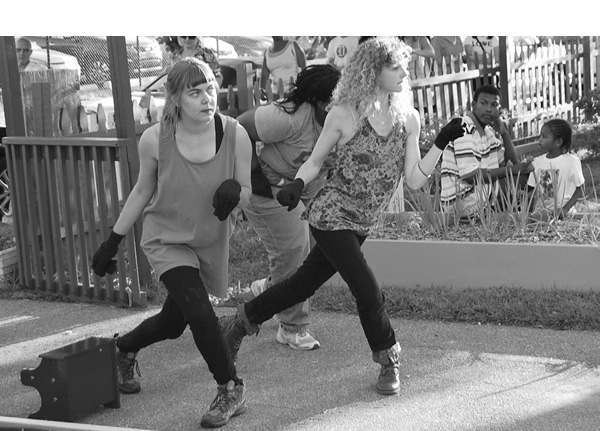
THE HARROWING
first performed on August 3, 2013
Community Garden in Brightmoor, Detroit, MI
performed twice in 2013
A HOST OF PEOPLE / JAKE HOOKER / SHERRINE AZAB
Corinne Donly, Bethany Hedden, Emily Roll, Yewande Odetoyinbo, Karilu Forshee
Detroit, MI
701763798i701763798n701763798f701763798o701763798@701763798a701763798h701763798o701763798s701763798t701763798o701763798f701763798p701763798e701763798o701763798p701763798l701763798e701763798.701763798o701763798r701763798g
www.ahostofpeople.org
THE HARROWING
A HOST OF PEOPLE / JAKE HOOKER / SHERRINE AZAB
A HOST OF PEOPLE / Jake Hooker / Sherrine Azab
“The Harrowing” is a site-responsive contemporary theater piece engaging with outdoor urban community gardens—not only their physical makeup, but the activities (the work) done there. With “The Harrowing,” A Host of People looks at the roots of things and words; stories and histories. The word “harrowing” means “extremely distressing, painful,” so termed because a harrow is the name for a heavy wooden rake which is used to distress the soil; but, “distress,” in its original sense, means simply “to compel; make an impression” as one tries to do when creating a performance. The word “rehearse” comes from the Anglo-French rehercier—“to go over again, repeat” or, to rake or harrow.
Detroit’s communities, as well as many others, are home to both definitions.
We’ve created a performance collage that includes texts from diverse sources, movement inspired by the labor of gardening, and music, sound, and even power, generated entirely by the ensemble via purpose built bike-generators. The piece is built to be iterative and is structured into plots and rows, as gardens are, responding to the particularities of each site. Indeed, as the piece travels from garden to garden, we work with each community to identify a local person who performs the role of the Local Host, delivering, amongst other things, a speech of his or her own composition, responding to the question: “Why are we here?” In this way the company makes a richer connection with the local community, locates the work specifically, and is able to maintain the generative energy that is at the heart of A Host of People’s theatrical devising practice. By the end, the performance unfolds into a garden party allowing for the organic interweaving of people to occur around a shared social experience. By partnering with local gardens we celebrate the similarities of “makers”—those individuals who don’t sit still but strive to create what they need for nourishment, whether food or art.
A Host of People plans to continue to tour this work to community gardens in Detroit and beyond during the summers of 2014 and 2015.